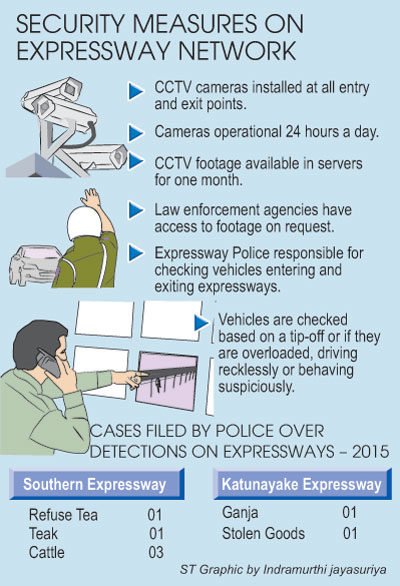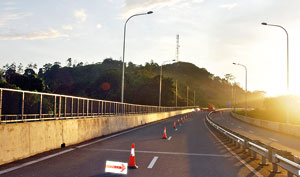News
Criminals take the high road
 Smugglers and criminal gangs are using expressways, where traffic largely runs unchecked, as conduits for illegal business, say authorities who foiled a gang hoping to shift 110kg of heroin along the Southern Expressway to Colombo.
Smugglers and criminal gangs are using expressways, where traffic largely runs unchecked, as conduits for illegal business, say authorities who foiled a gang hoping to shift 110kg of heroin along the Southern Expressway to Colombo.
The Police Narcotics Bureau (PNB) is investigating the consignment of heroin found on a vessel off the southern coast on March 30. As of last evening, 17 persons, 14 of them foreigners, were in custody after being arrested in a joint police-naval operation.
On Thursday, the 14 foreigners – 10 Iranians, two Pakistanis, an Indian and a Singaporean – were produced before Colombo Fort Magistrate’s Court. Thirteen of them were remanded until April 19 while the other suspect, who is 12 years of age, was sent to the Makola Children’s Home.
Two of the foreigners were arrested while trying to enter the Colombo-Katunayake Expressway in a bid to escape from police.
The navy’s claim that the now dismantled international drug trafficking network had planned to smuggle the drugs using the Southern Expressway raised eyebrows.
Navy spokesman Captain Akram Alavi stood by the navy’s claims this week, telling the Sunday Times that the information had been gathered by naval intelligence and was credible. 
Police spokesman ASP Ruwan Gunasekara said he could not comment. “It might disrupt the probe if we were to go into detail,” he cautioned, but confirmed that contrabrand was being transported along expressways.
Statistics released by police in February note that last year, police had initiated legal action over the alleged transportation of refuse tea, teak, cattle and ganja along the Southern and Colombo-Katunayake expressways.
Sri Lanka currently has three different expressways: The Southern Expressway (E01), the Outer Circular Highway (E02) and the Colombo-Katunayake Expressway (E03).
The Southern Expressway connects to the Outer Circular Highway at Kottawa. A vehicle entering the Southern Expressway from its current end-point at the Godagama interchange in Matara can travel all the way up to Kadawatha where the Outer Circular Highway currently ends. Unless there are grounds for suspicion or a traffic violation committed, the vehicles are not stopped by police.
The expressway network is managed by the Road Development Authority’s (RDA) Expressway Operation Maintenance and Management Division.
The division’s Director, S. Opanayake, said the Expressway Police were responsible for any checking of vehicles that enter and exit all expressways.
“The police check for vehicles seen driving recklessly, overloaded or behaving in a suspicious manner. Sometimes, there are searches conducted on a particular vehicle following a tip-off,” he explained.
The Deputy Director of the Southern Expressway, R.A.D. Kahatapitiya, told The Sunday Times that law enforcement agencies sometimes request RDA CCTV footage to aid investigations.
He said CCTV cameras were installed at all entry and exit points of the expressways, meaning footage is available of all vehicles entering and exiting the expressway network. This footage is kept for a month before being erased.
Mr. Kahatapitiya acknowledged that people were attempting to use the expressways, including the Southern Expressway, to smuggle various types of contraband, including drugs.
“Police have detected vehicles transporting illegal meat, cattle, endangered butterflies and other types of endemic animals as well as wallapatta and wood from valuable trees along the Southern Expressway,” he said.
The Deputy Director described one occasion when a passenger bus sans any passengers had been stopped by police while exiting the Southern Expressway. A search had revealed a consignment of teak logs inside.
“When it comes to heroin and other types of drugs, smugglers take elaborate precautions to hide the contraband, including constructing secret compartments inside the vehicles. You need to carry out an extensive search in order to detect them,” Mr. Kahatapitiya pointed out.
Environmentalists have also noted the expressway network was being used by smugglers, including foreigners, to transport valuable endemic species with the ultimate aim of taking them out of the country.
In the latest such incident on March 27, two nationals from the Czech Republic were arrested after being found to be in possession of live plants and insects. The suspects had been travelling on the Southern Expressway from Matara when police arrested them along the Outer Circular Highway in Kaduwela, according to reports.
They had reportedly been in possession of caterpillar cocoons and indigenous herbal plants when arrested.
Environment Conservation Trust Director Sajeewa Chamikara said while it was difficult to conclusively say smuggling of endemic plant and animal species has increased due to the expressway network, it was definitely being used extensively for such activities.
He noted that the largest fine ever imposed on a foreigner found guilty of smuggling endemic species (Rs.1.55 million), was done so after he was detected trying to smuggle out insects and other species from the Sinharaja Rainforest.
“He was trying to use the Southern Expressway to transport the insects and DNA samples of various species when they caught him.”

The Southern Expressway
Mr. Chamikara also revealed that authorities were on the trail of a wealthy local businessman allegedly involved in the smuggling of star tortoises and horned lizards, who used the expressway network to transport his illegal goods to avoid detection.
“He sells these creatures as pets. He smuggles them along the Colombo-Katunayake Expressway all the way to the Bandaranaike International Airport,” Mr. Chamikara said. He added that according to their investigation, a Customs official at the airport, who is in league with the suspect, then ensures the “cargo” is safely loaded onto the plane.
“On days that this particular Customs officer is not on duty, the businessman takes the Southern Expressway to Mattala Airport, where security is more relaxed, and smuggles the creatures out of the country from there,” said Mr. Chamikara.
He said it was time for authorities to ensure that law enforcement officials go beyond looking at expressways simply in terms of nabbing traffic offenders. “There is far more going on here than just traffic violations.”

